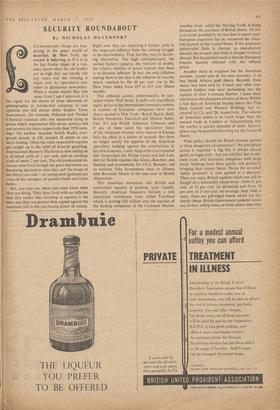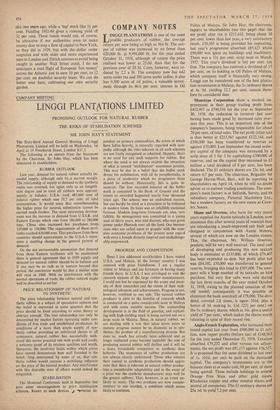SECURITY ROUNDABOUT
By NICHOLAS DAVENPORT a dividend yield of per cent. and an earnings yield of under 2 per cent. The old professional in- vestors who lived through the great depression are becoming alarmed at what they call 'the boom of the thirty-year-olds'—so young (and ignorant) are most of the managers of pension funds and trusts today.
But, you may say, these men must know what they are doing. They have lived with an inflation and they realise that investing in equities is the only way they can protect their capital against the continual fall in the purchasing power of money. Right now they are expecting a further push to the wage-cost inflation from the coming struggle in the steel industry. True, but they may he deceiv- ing themselves. The high unemployment, the unused factory capacity, the restraint of profits, the relative stability of prices indicate that there is no demand inflation. In fact, the only inflation staring them in the face is the inflation of security prices—marked by the 40 per cent. rise in the Dow Jones index from 437 to 61'5 over fifteen months.
This inflation cannot, unfortunately, be con- tained within Wall Street. It spills over and affects equity prices in the international monetary centres. A number of European companies have their shares quoted in New York—Royal Dutch, Shell, British Petroleum, Electrical and Musical Indus- tries, ICI and British American Tobacco—and if any of these catch the speculative fancy of the American investor every bourse in Europe feels the effect in a matter of seconds. But these no longer satisfy the appetite of the American speculator hedging against the uncertainties of his own economy. Lately huge orders have poured into Amsterdam for Philips Lamp and into Lon- don for British equities like Glaxo, Beecham and Dunlop and occasionally for GUS. Bowater, not to mention Tube Investments since its alliance with Reynolds Metals in the take-over of British Aluminium.
This American movement into British and continental equities is growing quite rapidly. Recently American financiers formed a new closed-end investment trust called Eurofund which is putting $50 million into the equities of the leading companies of the Common Market. Another trust, called the Sterling Fund, is being formed for the purchase of British shares. All this is no doubt justified by the fact that in recent years European expansion has far surpassed the indus- trial growth of the United. States, If the American industrialist finds it cheaper to manufacture abroad, the investor also finds it cheaper to invest abroad. But the painful result is that the European bourses become infected with the inflated prices.
Another form of escapism for the American investor, scared also of his own, currency, is to buy South African gold shares. Recently these shares had been sold by French and other con- tinental holders who were exchanging into the equities of their Common: Market. Custos drew attention to the cheapness of some of them. Within a few days on American buying shares like Free State Geduld and Western Holdings had re- covered by 12s. and 20s. respectively. The volume of American orders is so much larger than the normal trade in London or Johannesburg that the market is quickly denuded of stock. Scarcity prices may be quoted before long for the favoured shares.
What policy should the British investor pursue in these dangerous circumstances? No precipitate action is required—a big fish is always played gently to begin with—but you will find that invest- ment trusts and insurance companies with large dollar holdings have been quietly and gradually bringing their money home. Hence the so-called `dollar premium' is now quoted at a discount. There are many British equities which can still be bought on a reasonably cheap basis—from 4-1 per cent. to 51 per cent. on dividends and from 10 per cent. to 15 per cent. on earnings,. And, what is more, there are gilt-edged bonds which are dis- tinctly cheap. British. Government undated stocks are, in fact, selling today at lower prices than they
did two years ago, while a 'tap' stock like 54 per cent. Funding 1982-84 gives a running yield of 5} per cent. These bonds would not, of course, be attractive if our authorities were to make money dear to stop a flow of capital to New York, as they did in 1929, but with the dollar under suspicion and with older and more experienced men in London and Zurich anxious to avoid being caught in another Wall Street crash, I do not anticipate a mad flight of European 'hot money' across the Atlantic just to earn 10 per cent. to 12 per cent. on doubtful security loans. We can do better over here, cultivating our own security garden.







































 Previous page
Previous page